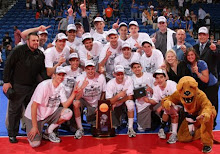Thursday, February 19, 2009
Rotator Cuff Tear
A rotator cuff tear is very common in many sports where your arm is above your head a lot. "Wow! My arm is above my head a lot in volleyball!" Yeah... it happens a lot to volleyball players. :) Here is some basic information to help you identify, treat, and prevent rotator cuff injuries.
Symptoms: Pain on the outside of the shoulder and upper arm, pain when lifting the arm above your head, and general pain in the evening and night. Decreased strength when pushing outward and raising the arm. A doctor would be able to target the location of your tear based on where your weakness is centralized. People who have torn their rotator cuff often complain that combing their hair and reaching behind their back is especially difficult.
Muscles involved: Infraspinatus, teres minor, and supraspinatus
Treatment: Rest and ice for 2-4 days during the acute stage of the injury. Apply heat later. A sports injury specialist might prescribe anti-inflammatory medications, apply ultrasound or laser treatment, and use massage and stretching techniques. They would also be able to put you on a rehab program that incorporates stretches and exercises for quicker recovery.
Prevention: Proper strength training is key here. Make sure you incorporate outward rotation exercises using elastic or light weights. Always make sure you stretch adequately before playing as well.
Subscribe to:
Post Comments (Atom)



The first thing to recognise before talking about symptoms of any injury is that your symptoms are unique to you. Your cuff injury symptoms are no different. They Rotator Cuff Symptoms affect different people in different ways.I can talk in general terms about rotator cuff injury symptoms such as rotator cuff inflammation, weakness and pain. That does not mean that you will or should be experiencing any or all of these things.
ReplyDelete